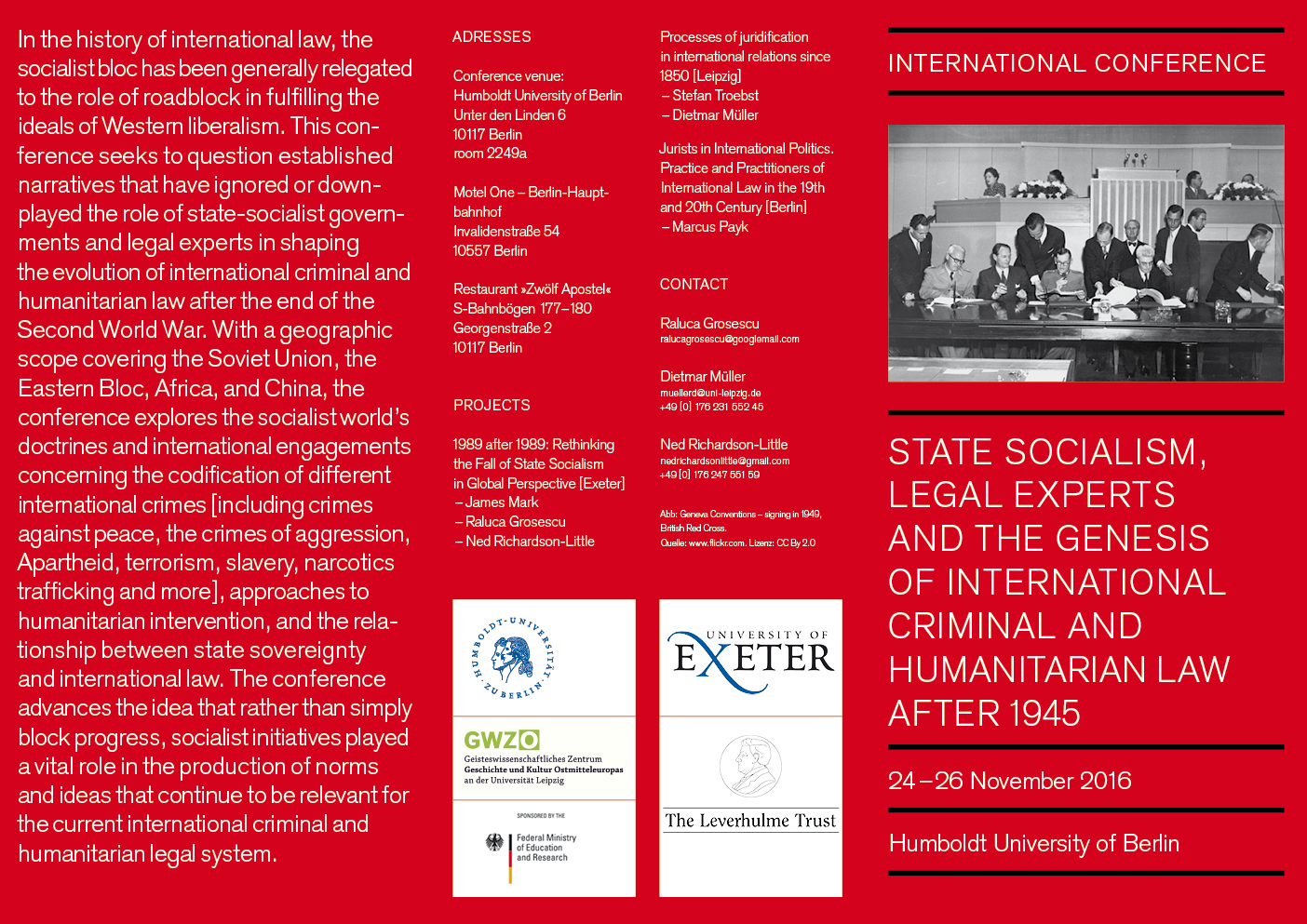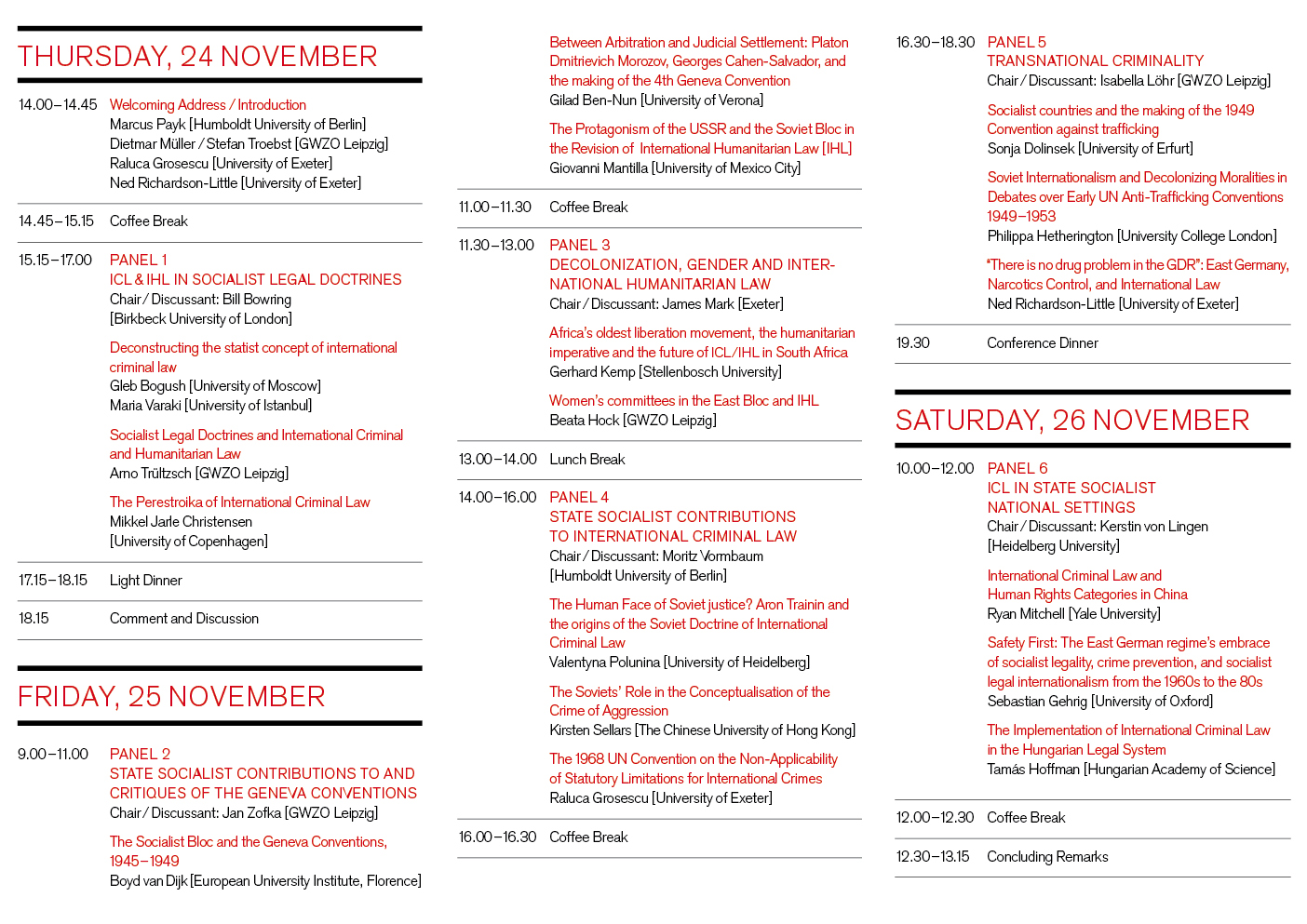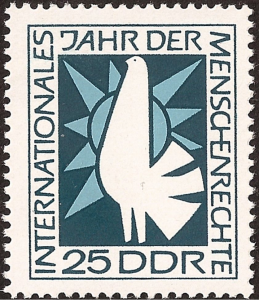State Socialism & International Criminal & Humanitarian Law after 1945 Conference Programme
Posted on 15 November, 2016 in1989 after 1989 Eastern Europe International Criminal Law International Humanitarian Law Socialism South Africa Transitional justice

State Socialism, Legal Experts and the Genesis of International Criminal and Humanitarian Law after 1945
November 24-26, 2016
 Conference Venue:
Conference Venue:
Humboldt University of Berlin
Unter den Linden 6
10117 Berlin
Room 2249a
The programme for our international collaborative conference with the Leipzig Centre for the History and Culture of East-Central Europe (GWZO), and the Humboldt University of Berlin is now available. It will take place on the 24-26 November, 2016 at Unter den Linden 6, Room 2249a, Humboldt University of Berlin, Germany.
It brings together 3 research projects – 1989 after 1989, Processes of Juridification in International Relations since 1850 based at Leipzig and Jurists in International Politics Practice and Practitioners of International Law in the 19th and 20th Century based in Berlin.
Conference Synopsis
In the history of international law, the socialist bloc has been generally relegated to the role of roadblock in fulfilling the ideals of Western liberalism. This conference seeks to question established narratives that have ignored or downplayed the role of state-socialist governments and legal experts in shaping the evolution of international criminal and humanitarian law after the end of the Second World War. With a geographic scope covering the Soviet Union, the Eastern Bloc, Africa, and China, the conference explores the socialist world’s doctrines and international engagements concerning the codification of different international crimes (including crimes against peace, the crimes of aggression, Apartheid, terrorism, slavery, narcotics trafficking and more), approaches to humanitarian intervention, and the relationship between state sovereignty and international law. The conference advances the idea that rather than simply block progress, socialist initiatives played a vital role in the production of norms and ideas that continue to be relevant for the current international criminal and humanitarian legal system.
The conference commences at 14:00 on the 24 November with a welcome address and introduction from the conference organisers – Marcus Payk, Humboldt University of Berlin; Dietmar Mueller and Stefan Troebst, GWZO Leipzig; Raluca Grosescu, University of Exeter and Ned Richardson-Little, University of Exeter. Papers will then be presented that deal with International Criminal Law and International Humanitarian Law in socialist legal doctrines.
Panels on the following day will include papers on state socialist contributions to and critiques of the Geneva Conventions; decolonisation, gender, and International Humanitarian Law, state socialist contributions to International Criminal Law; and Transnational Criminality. The final day will debate International Criminal Law in state socialist national settings and will include case studies from China and Hungary.
To register your interest in attending this conference please contact Raluca Grosescu and Dietmar Mueller
More information on the conference can be found on our conference pages.
Human Rights after 1945 in the Socialist and Post-Socialist World Conference Programme
Posted on 29 February, 2016 in1989 1989 after 1989 Cold War Globalisation Human Rights Socialism

March 3-5, 2016
German Historical Institute Warsaw
Conference Room, 3rd Floor
Organizers:
German Historical Institute Warsaw
1989 after 1989: Rethinking the Fall of State Socialism in Global Perspective
Georg-August University of Göttingen
Synopsis
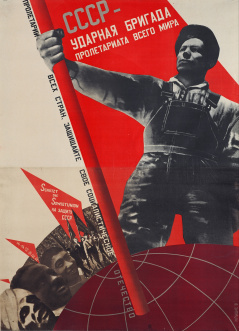 As both human rights and globalization have emerged as dynamic fields of historical and sociological research, the “socialist world” is relegated to a supporting role in the triumph of Western capitalism and liberal democracy. The aim of this conference is to question established narratives that have ignored or downplayed the role of socialist ideas, practice, and experts—be they state officials, loyal intellectuals or dissident activists — in the development of international human rights ideas, discourses, and systems in the post-war era. With a geographic scope that covers the Soviet Union, the Eastern Bloc, Yugoslavia and China, we hope to show that the socialist world did not just react passively to Western human rights politics, but was a vital participant in the production of global human rights with legacies that continued past the revolutions of 1989. By examining the socialist contribution to the evolution of human rights, we hope to contribute to revising standard narratives of globalization that focus exclusively on the perceived winners of these processes.
As both human rights and globalization have emerged as dynamic fields of historical and sociological research, the “socialist world” is relegated to a supporting role in the triumph of Western capitalism and liberal democracy. The aim of this conference is to question established narratives that have ignored or downplayed the role of socialist ideas, practice, and experts—be they state officials, loyal intellectuals or dissident activists — in the development of international human rights ideas, discourses, and systems in the post-war era. With a geographic scope that covers the Soviet Union, the Eastern Bloc, Yugoslavia and China, we hope to show that the socialist world did not just react passively to Western human rights politics, but was a vital participant in the production of global human rights with legacies that continued past the revolutions of 1989. By examining the socialist contribution to the evolution of human rights, we hope to contribute to revising standard narratives of globalization that focus exclusively on the perceived winners of these processes.
Conference Programme
Thursday, 3 March 2016
14:00-14:30
Welcoming Address
Ruth LEISEROWITZ (German Historical Institute Warsaw)
14:30-15:30
Introductory Panel: State Socialism, Human Rights and Globalization: In Search of a New Narrative
Hella DIETZ (Georg-August University of Göttingen)
Ned RICHARDSON-LITTLE (University of Exeter)
Robert BRIER (London School of Economics)
15:30-16:00 Coffee break
16:00-18:00
Panel 1: Defining Human Rights Internationally
Steven JENSEN (Danish Institute for Human Rights)
Defining the Social in the Global: Social Rights, UN Diplomacy and the Emergence of International Non-Discrimination Norms and Politics, 1950-1960
Alexander OSIPOV (European Centre for Minority Issues)
The Soviet Union’s Involvement in the Establishment of the European Minority Rights Regime
Discussant: Arnd BAUERKÄMPER (Free University Berlin)
19:00 Conference Dinner
Friday, 4 March 2016
09:00-11:00
Panel 2: State-Socialist Conceptions of Rights and Human Rights
Jennifer ALTEHENGER (King’s College London)
Rights, Not Human Rights: Communist China’s National Constitution Discussion, 1954
Michal KOPEČEK (Institute for Contemporary History, Prague and Charles University, Prague)
Socialist Conceptions of Human Rights and its Dissident Critique
Todor HRISTOV (University of Sofia)
Rights to Weapons: Human Rights as a Resource in Workplace Conflicts in Late Socialist Bulgaria
Discussant: Paul BETTS (Oxford University)
11:00-11:30 Coffee Break
11:30-13:00
Panel 3: Tolerance, Difference, and Rights under Socialism
Ivan SABLIN (University of Heidelberg)
Illusive Tolerance: Buddhism in the Late Soviet State
Zhuoyi WEN (Hong Kong Institute of Education)
Contesting Cultural Rights in Post-socialist China
Discussant: tba
13:00-14:30 Lunch break
14:30-16:00
Panel 4: Human Rights as Socialist Foreign Policy
Sebastian GEHRIG (Oxford University)
The Fifth Column of the Third World? The East German Quest for International Recognition through UN Rights Discourses
Jens BOYSEN (German Historical Institute Warsaw)
Polish Engagement in the United Nations as a Tool for Justifying Communist Rule in Poland and Gaining Leeway in the Warsaw Pact
Discussant: Robert BRIER
(London School of Economics)
16:00-16:30 Coffee Break
16:30-18:00
Panel 5: Transnational Movements and Flows
Christie MIEDEMA (University of Amsterdam)
Negotiating Space for International Human Rights Activism: Amnesty International in Eastern Europe before 1989
Rósa MAGNÚSDÓTTIR (University of Aarhus)
Soviet-American Intermarriage: Transnational Love and the Cold War
Discussant: James MARK (University of Exeter)
19:00 Dinner for the conference participants
Saturday, 5 March 2016
9:00-11:00
Panel 6: Dissent and Human Rights
Simone BELLEZZA (University of Eastern Piedmont)
The Right to Be Different: Ukrainian Dissent and the Struggle Against a Global Consumerist Cultural Standardization
Hermann AUBIÉ (University of Turku)
Between Loyalty and Dissent: Revisiting the History of Human Rights in China Through the Discourse of Chinese Intellectuals and Dissidents
Zsófi a LÓRÁND (European University Institute, Florence)
Feminist Dissent, Activism for the Elimination of Violence against Women, and the Human Rights Discourse in Yugoslavia in the 1970s-1980s
Discussant: Celia DONERT (University of Liverpool)
11:00-11:30 Coffee Break
11:30-13:00
Concluding Panel: The Place of State Socialist Societies in the Global History of Human Rights
Paul BETTS (Oxford University)
James MARK (University of Exeter)
Celia DONERT (University of Liverpool)
Writing Human Rights into the History of State Socialism
Posted on 24 March, 2014 in1989 after 1989 Human Rights

By Ned Richardson-Little
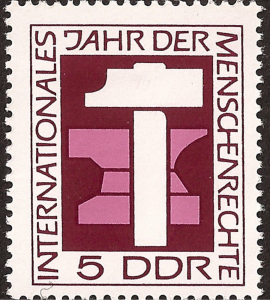
One of a number of East German postage stamps commemorating International Human Rights Year 1968. The hammer and anvil represent the right to work
The collapse of the Communist Bloc in 1989-1991 is viewed as one of the great triumphs of the human rights movement. But this ignores how socialist elites of the Eastern Bloc viewed themselves: not as the villains in the story of human rights, but as the champions.
In recent years, the rapidly expanding field of human rights history has done much to complicate triumphalist narratives of inevitable victory for Western liberal democracy over the forces of tyranny. Recent collections including those edited by Stefan-Ludwig Hoffmann, Jan Eckel and Samuel Moyn, have opened up new lines of inquiry exposing not only the contingency of these ideas, but also the conflicts amongst those claiming the mantle of universal human rights. On the Exeter University Imperial and Global History Centre blog in recent weeks, Fabian Klose has examined the important role of decolonization and post-colonial states in shaping the development of human rights politics, and Robert Brier has interrogated the idea of human rights as a product of neo-liberalism in the context of the Polish opposition. Here, I want to look beyond the human rights campaigns of dissident Eastern Europeans to that of the states they fought against.
While state socialism is normally seen as the definitional opponent of human rights – rejecting individual autonomy, independent justice, free elections, free speech and free practice of religion – the elites of the Eastern Bloc claimed that they were actually the true representatives of human rights. For them, the revolutionary victory over capitalism meant the end of class conflict and the abolition of the “exploitation of man by man.” The creation of a socialist society overcame the horrific abuses of the capitalist system, including war, imperialism and racism.
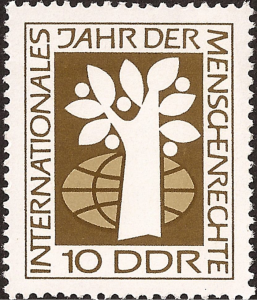
Another stamp commemorating International Human Rights Year 1968. The tree and globe represent the right to life
Eastern Bloc elites built upon Karl Marx’s denunciation of human rights rhetoric as a tool of the bourgeoisie to disguise their own class interests in the cloak of universal justice. They argued that while human rights were indeed a sham under capitalism, the socialist revolution had created a higher kind of human rights that allowed for real participation in all forms of political and economic life and achieved true equality across the class, race and gender lines. As the East German legal philosopher Karl Polak declared, “There can be no human rights without socialism!”[1]
When such rhetoric from the Eastern Bloc has been noted in histories of the Cold War, it is usually dismissed as a crude and cynical attempt to deflect Western criticism, particularly after the signing of the Helsinki Accords in 1975. That is, once the communist states were compelled to affirm the idea of human rights, they simply had to adjust their rhetoric in a desperate attempt to fend off protest from within and without.[2] These narratives are undermined, however, by the fact that state socialist elites were using the language of human rights well before Helsinki – the quote above from Karl Polak dates to 1946. In Hungary, the first scholarly work on human rights and socialism was written by legal scholar Imre Szabo in 1948.[3] As Jennifer Amos and Daniel Whelan have demonstrated, the Soviet Union was an active player in the human rights diplomacy of the 1950s. Such early efforts weren’t just rhetorical or academic: the German Democratic Republic formed the Committee for the Protection of Human Rights to campaign against abuses by the West and to mobilize citizens to campaign against the imprisonment of communists and peace activists in West Germany. Founded in 1959, this group predates the creation of Amnesty International by two years.
The 1970s are today seen as the turning point when international human rights exploded as a global movement, but at the beginning of the decade, it appeared to some observers that the West was simply outmatched by the Socialist Bloc. By 1968, the entirety of the Eastern Bloc had either signed or publically affirmed the UN’s International Covenant on Civil and Political Rights. While the United Kingdom, Italy, and West Germany did so early on, other Western countries lagged well behind with Canada signing in 1976, the USA in 1977 and France in 1980. In 1973, one observer from West Germany concluded,
With the change in majorities in the bodies of world organizations – particularly in the [UN] General Assembly – the socialist states have recognized the possibility of the politicization of human rights, and the free world has almost cleared off the field without a fight: the US by its human rights abstinence, the Western European countries by their regionalism.[4]
While the Helsinki Accords are now often portrayed as a coup for the West in “forcing” the East to accept terms that would eventually lead to its downfall, at the time, the idea of human rights was hardly seen as a devastating ideological weapon.
Including the perspective of state socialist leaders and elites is crucial to understanding human rights diplomacy in the post-war era. Such ideas and politics also were crucial to state socialist rule and influenced the development of dissident and opposition movements, as I have recently argued, along with Benjamin Nathans, Paul Betts, and Mark Smith and others. Celia Donert’s recent work similarly demonstrates how the explosion of women’s rights as human rights in 1990s can be in part traced back to the transnational feminism organized through Eastern Bloc organizations and events that have been dismissed as mere propaganda for communism. Rather than simply seeing the rise of human rights movements in the East as a direct importation from the West, this new scholarship shows how 1989 was also connected to the evolution of indigenous right cultures that were initially fostered by the state. This line of inquiry is not only valuable to the study of the Cold War and its end, but also to explaining the development of human rights politics in the post-socialist period.
In challenging liberal Western triumphalism, it is also vital to consider the perspectives of the socialist East. The appropriation of the idea of human rights by non-liberal and even dictatorial states is no relic of Cold War dynamics long since departed, but is continuing to this day in Iran and North Korea. In grappling with the developments of 1989, political scientist Peter Juliver argued that one had to begin a process of “rethinking rights without the enemy.” I would argue that in order to do so, we first must rethink the history of human rights including the “enemies,” and not just the victors.
[1] Karl Polak, “Gewaltteilung, Menschenrechte, Rechtsstaat: Begriffsformalismus und Demokratie,” Einheit 7 (December 1946): 138.
[2] For the main work asserting the discontinuous effect of Helsinki Accords for the Eastern Bloc, see Daniel Thomas, The Helsinki Effect: International Norms, Human Rights, and the Demise of Communism(Princeton UP, 2001) as well as Michael Ignatieff, Human Rights as Politics and Idolatry, University Center for Human Values series (Princeton UP, 2001), 19, which argues that the Eastern Bloc denied the validity of political and civil human rights prior to Helsinki.





